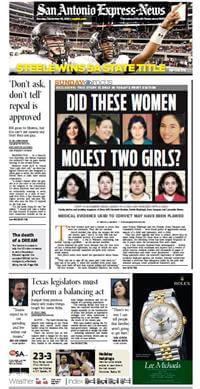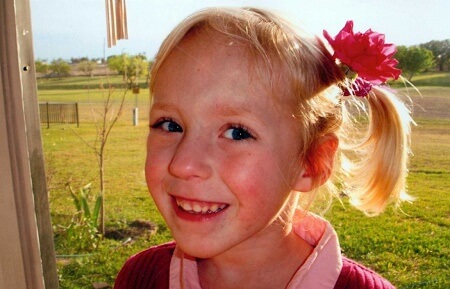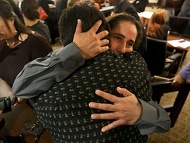 A great news story tells readers something new about the world in a compelling way. It’s even better if the reporter digs up the story through her own initiative. And it’s even better if the issue is so important or shocking that readers simply can’t put down the paper or — nowadays — their iPad.
A great news story tells readers something new about the world in a compelling way. It’s even better if the reporter digs up the story through her own initiative. And it’s even better if the issue is so important or shocking that readers simply can’t put down the paper or — nowadays — their iPad.
Michelle Mondo’s bizarre story about four women who might have been wrongly convicted of molesting two girls certainly qualifies.
Michelle learned of the case when an essay about it was published in April 2009 in Texas Monthly. The author, a Canadian professor named Darrell Otto, had been surfing the Internet and found a 1998 Express-News article about four friends — Anna Vasquez, Cassandra Rivera, Elizabeth Ramirez, and Kristie Mayhugh — who were all serving long prison sentences for a strange crime:
Four young women in that city, acting on their own, had allegedly restrained and, in ritualistic fashion, sexually assaulted two girls, aged seven and nine, over two days. There was no physical evidence tying the women to the assaults, yet the newspaper reported the case against them without a hint of skepticism. It mentioned nothing about mental illness or confessions. Psychology-wise, the only point noted was that the women were lesbians, although academic research clearly shows lesbians are not predisposed to sexually abuse children. I was frustrated by the lack of information.
Otto was convinced the women had been wrongly convicted. Express-News Metro Editor Jaime Stockwell read the essay and asked Michelle to look into the case.
This wasn’t press-release journalism that critics of the media rightly complain about. Michelle spent 18 months on the story, whittling away at it in her spare time as a crime reporter for the Express-News. It wasn’t easy. When I stopped by her desk last week to ask her about it, the beeps and sporadic radio transmissions from the police scanners she was monitoring occasionally interrupted us. Try investigating a possible wrongful conviction when at any moment you have to drop everything and run out to a structure fire.
Related: ‘San Antonio 4’ set free after doubts raised in bizarre criminal case
Michelle stuck with the story. She dug up old court records, tracked down family members, interviewed the convicted women, and waded through “accusations and counter accusations involving different famlies in different states,” she said.
Her findings were published on the newspaper’s front page:
A San Antonio Express-News investigation — including interviews with witnesses and experts and a review of police reports, medical studies and thousands of pages of trial transcripts and other court documents — raises troubling questions about the scientific legitimacy of medical evidence deployed against the women, whether authorities checked a previous rape allegation made by the girls and whether anti-gay views prejudiced Ramirez’s jury.
In two trials, the defense called no witnesses to rebut the testimony of pediatrician Nancy Kellogg, then as now the medical director of Child Safe — at the time, it was called the Alamo Children’s Advocacy Center. But research available when she examined the girls classified the three signs of sexual trauma she found as either normal, inconclusive or impossible to identify as a scar, as she did.
On and off the witness stand, the girls changed their accounts of the timing, weapons, perpetrators and other basic details of the assault every time they told it to authorities, records show.
The girls’ family was mired in conflict before and after the trials, with members making abuse claims in two Texas counties and in another state. It wasn’t the first time the nieces had made a rape outcry.
The trial of Ramirez, held separately from the other women, showcased her sex life, and her jury foreman, a minister, had told attorneys that homosexuality was wrong on religious grounds.
When Michelle interviewed the convicted women for her story, they maintained their innocence — and wondered where the media had been all this time.
“All four of them asked me, ‘Why was I doing the story now?'” Michelle said.
It’s a fair question. Had reporters failed to scrutinize this case in the 1990s when it really mattered?
I checked our news archives. There were about a half dozen stories about the trials, including one with the headline: “Defendants say accusers made up story of assault.” The stories described the crime as a gang rape. I couldn’t really find any in-depth coverage — the articles ran in the Metro section and the longest one I found was about 500 words long. At the time, I had been at the paper for about a year but today I don’t even remember the trials. It looks like the charges were part of the depressing, never-ending stream of twisted child abuse and murder cases in Bexar County that we keep having to write about. Most of the time, those heinous crimes really did happen. Most of the time.
Related: How to contact an investigative reporter
This being Texas, Michelle is doubtful the women will be freed any time soon. But after the story ran, she’s heard from the women and their families. Maybe it’s too little too late, but it means something when a third party like Michelle comes in, spends a lot of time looking at the evidence, and publicly points out inconsistencies in a criminal case that shattered the lives of the defendants.
“For them, it was a very big deal for somebody to point out, ‘Wait a minute, these women aren’t what they were portrayed as,'” Michelle said.



